
Global Infrastructure Summit Highlights Climate-Smart PPPs for Sustainable Development
What’s a Rich Text element?
The rich text element allows you to create and format headings, paragraphs, blockquotes, images, and video all in one place instead of having to add and format them individually. Just double-click and easily create content.
H1
H2
H3
H4
H5
H6


Static and dynamic content editing
A rich text element can be used with static or dynamic content. For static content, just drop it into any page and begin editing. For dynamic content,

add a rich text field to any collection and then connect a rich text element to that field in the settings panel. Vsadsadsdasdasdasdasdoila!
- A rich text element can be used with static or dynamic content. For static content, just drop it into any page and begin editing. For dynamic content, add a rich text field to any collection and then connect a rich text element to that field in the settings panel. Voila!
- t to that field
- t to that field
-
How to customize formatting for each rich text
How to customize formatting for each rich text
How to customize formatting for each rich text
Headings, paragraphs, blockquotes, figures, images, and figure captions can all be styled after a class is added to the rich text element using the "When inside of" nested selector system.
Andrea Betancourt from Global Infrastructure Basel Foundation (GIB) represented the FAST-Infra Label Secretariat at the PPPAmericas Global Infrastructure Summit focusing, speaking at a crucial panel on "Climate-smart structuring" in the Public Track. The virtual event brought together esteemed experts in the field to address pressing issues related to climate change and infrastructure development.
Panelists from various organizations graced the event, including Fernando Pieroni from the Semeia Institute, Michelle Young representing the Development Bank of Jamaica, and Andrea Betancourt from the Global Infrastructure Basel Foundation (GIB). The panel was skillfully moderated by Juan Pablo Bonilla from the IDB. The primary focus of the discussion was on building a portfolio of climate-smart infrastructure projects to bolster infrastructure investment, tackle climate change impacts, and foster replicable PPP (Public-Private Partnerships) models across Latin American and Caribbean (LAC) countries. It is projected that by 2050, LAC nations will bear annual climate change-related costs equivalent to 2-4 percent of their GDP, emphasizing the urgency of integrating climate considerations into evolving PPP models.
The panelists emphasized the significance of PPPs as they encourage private sector innovation and provide a balanced allocation of risk between private and public actors. By incorporating climate change issues into PPP models, it becomes possible to create synergies between infrastructure development and environmental conservation. Throughout the discussion, the panelists shared key insights and successful case studies from the region and beyond, highlighting the transformative potential of sustainable PPPs in traditional sectors. The need to create climate-smart infrastructure and foster resilient partnerships was underscored, aiming to mitigate and adapt to the adverse effects of climate change while creating a positive impact on the environment. Andrea Betancourt shared how the FISI label could help governments embed sustainability requirements in an efficient manner into their tendering processes, whilst ensuring that sustainability, climate change adaptation and resilience criteria are embedded into infrastructure projects from the planning stages.

The event brought together stakeholders, policymakers, and experts to lay the groundwork for collaborative efforts in the region's infrastructure development journey. With climate change looming as a formidable challenge, the discussions and ideas put forth in this panel contribute significantly to shaping the future of climate-smart infrastructure projects in LAC countries.
Further Reading
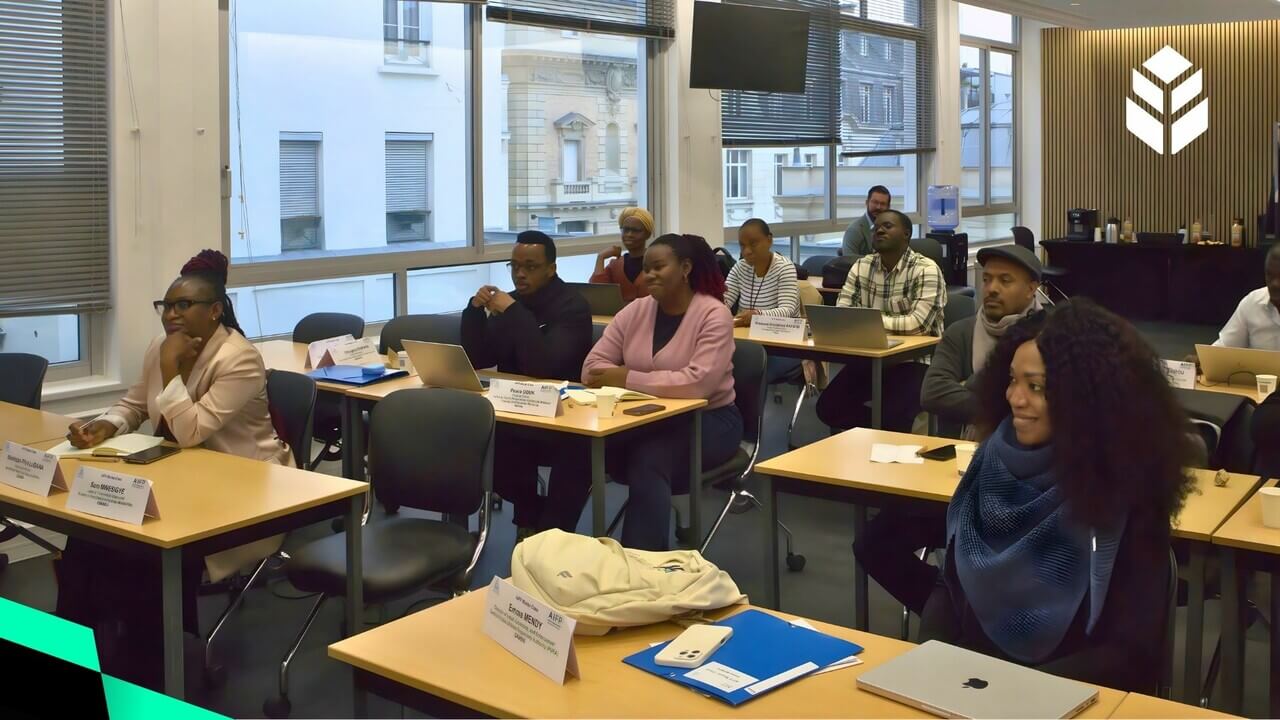
Africa Infrastructure Fellowship Program (AIFP) – GIB/FAST Lecture

Africa Infrastructure Fellowship Program (AIFP) – GIB/FAST Lecture

From Risk to Resilience: How PCRAM, PIDG and the FAST‑Infra Label Turn Climate Uncertainty into Investable Opportunity

From Risk to Resilience: How PCRAM, PIDG and the FAST‑Infra Label Turn Climate Uncertainty into Investable Opportunity
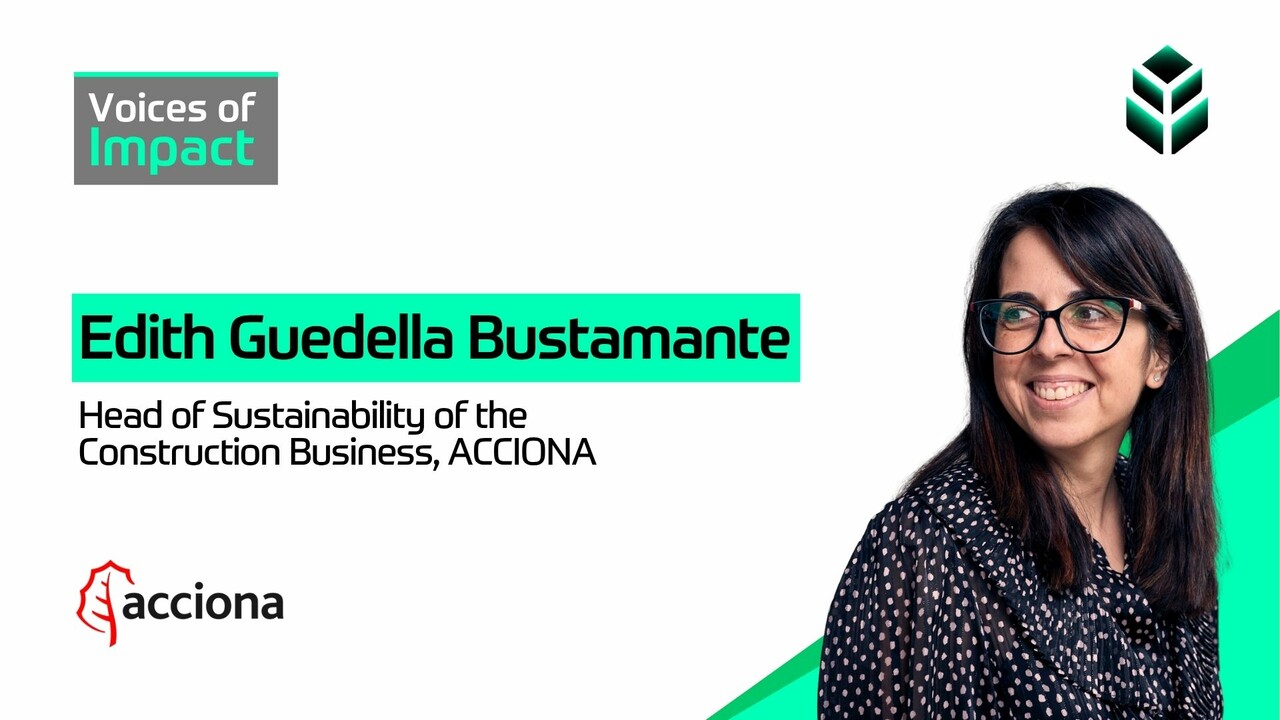
Advancing Regenerative and Resilient Infrastructure

Advancing Regenerative and Resilient Infrastructure

Tila-2 Hydropower Project in Karnali Province, Nepal

Tila-2 Hydropower Project in Karnali Province, Nepal

The Role of Sustainable Finance in Tackling Climate Change

The Role of Sustainable Finance in Tackling Climate Change

Cory Riverside: Turning London’s Waste into Reliable, Low-Carbon Power

Cory Riverside: Turning London’s Waste into Reliable, Low-Carbon Power
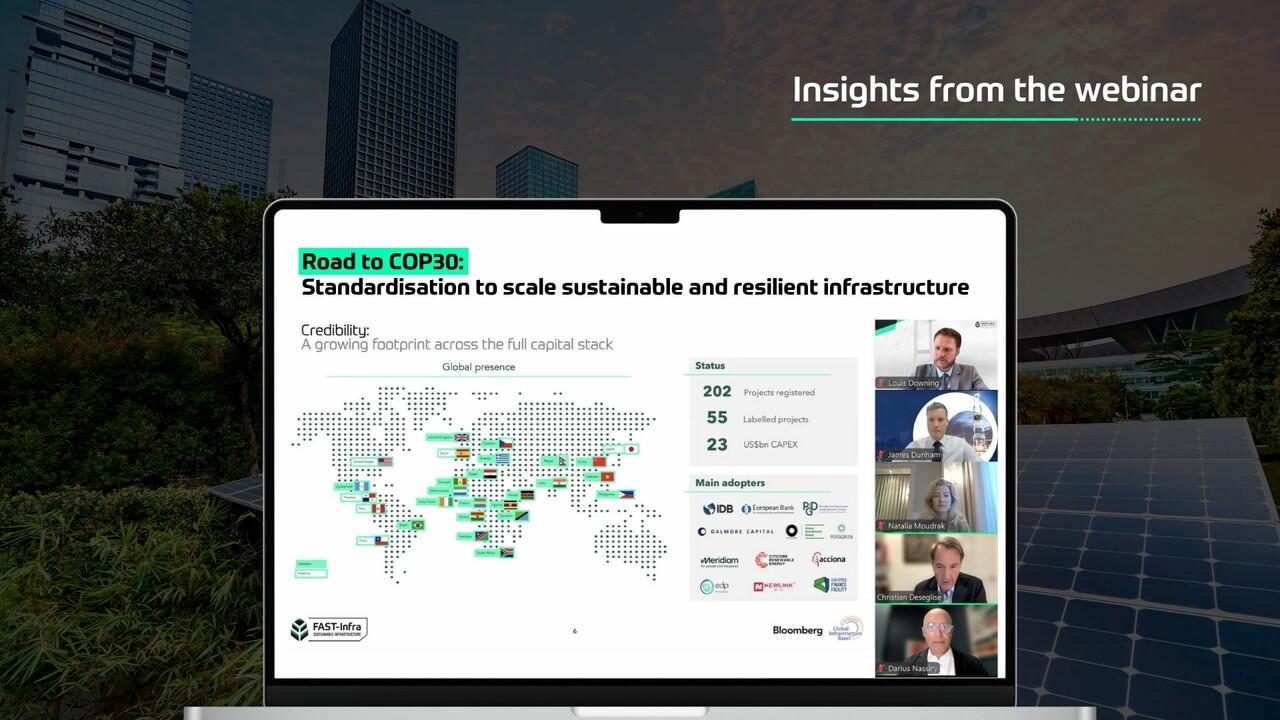
Road to COP30: Standardisation to Scale Sustainable and Resilient Infrastructure

Road to COP30: Standardisation to Scale Sustainable and Resilient Infrastructure

Setting a New Standard for Sustainable Healthcare in Brazil

Setting a New Standard for Sustainable Healthcare in Brazil

Unlocking Capital and Insurability

Unlocking Capital and Insurability
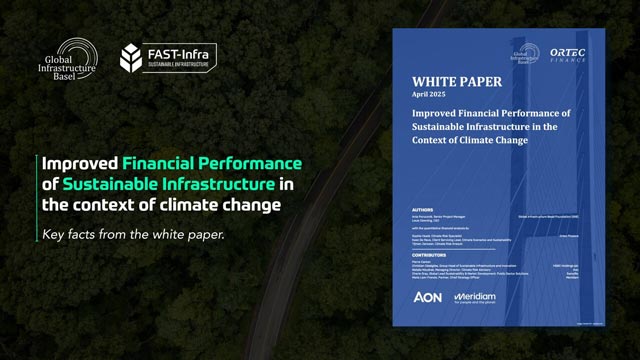
From risk to resilience, the financial case for sustainable infrastructure

From risk to resilience, the financial case for sustainable infrastructure

PPP Lote Ouro Preto - Estado de Minas Gerais

PPP Lote Ouro Preto - Estado de Minas Gerais

Building Sustainable and Resilient Infrastructure

Building Sustainable and Resilient Infrastructure
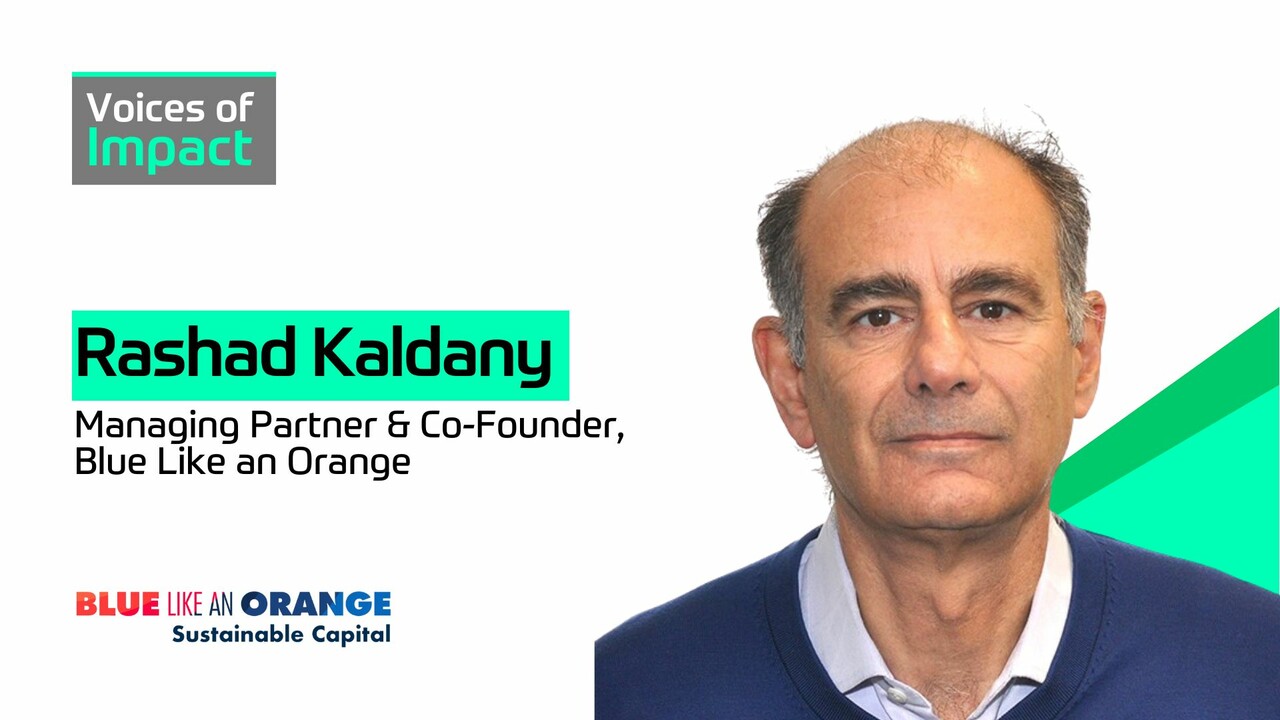
Mobilizing capital where it matters

Mobilizing capital where it matters

Role of Sustainable Infrastructure Labels in Turning Ambition into Action

Role of Sustainable Infrastructure Labels in Turning Ambition into Action

Announcement: Bureau Veritas as an official FAST-Infra Label Verifier

Announcement: Bureau Veritas as an official FAST-Infra Label Verifier
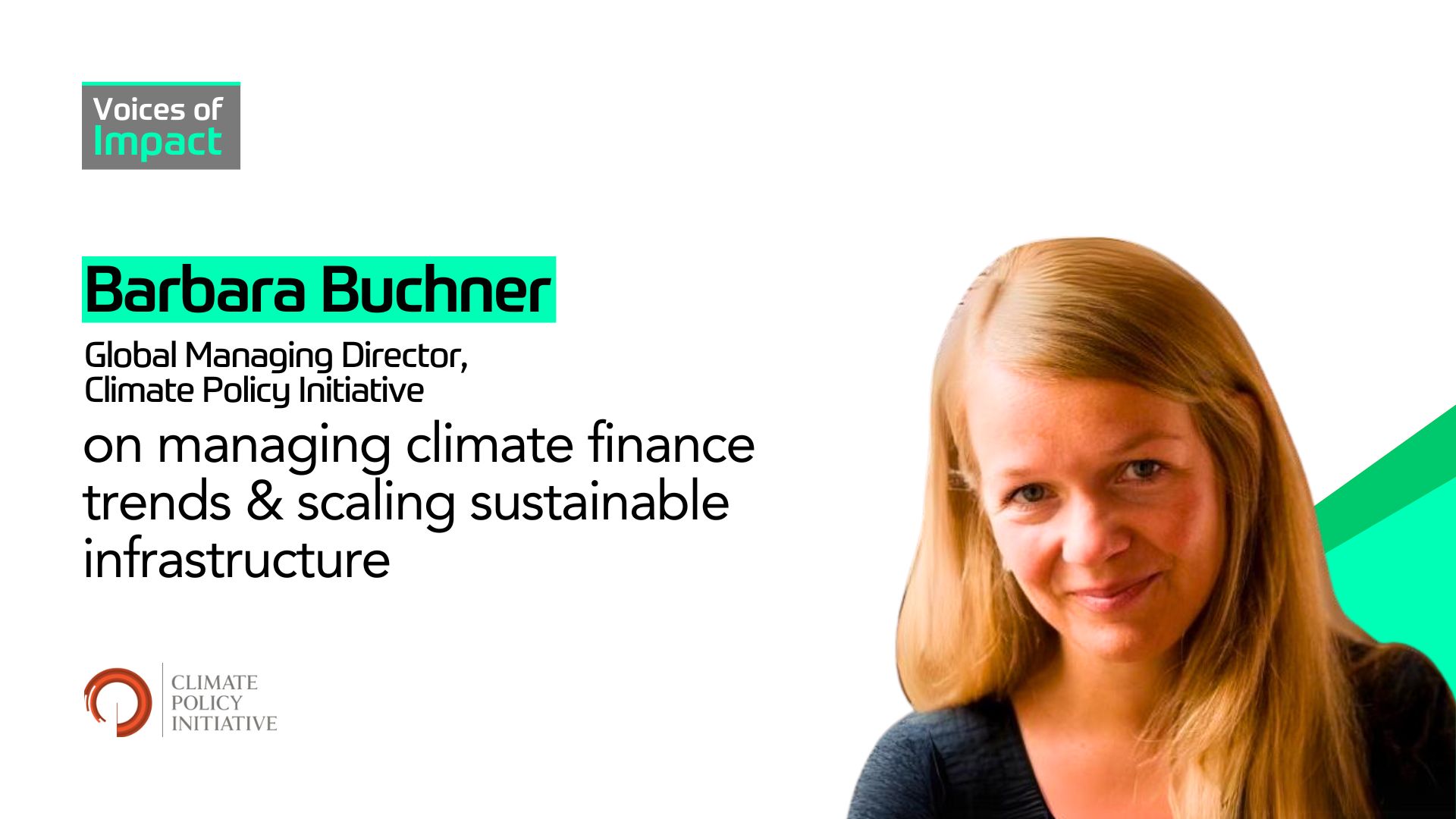
Scaling Climate Finance and Sustainable Infrastructure

Scaling Climate Finance and Sustainable Infrastructure
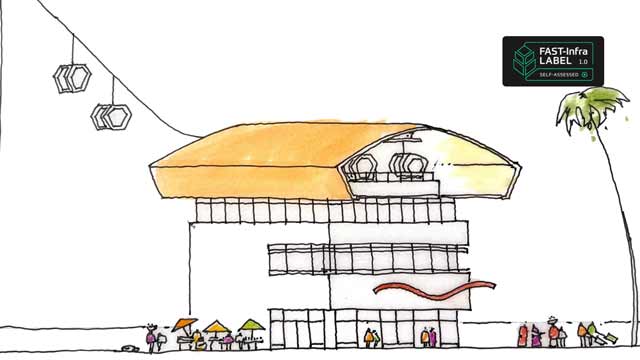
Reimagining Urban Mobility in Freetown, Sierra Leone

Reimagining Urban Mobility in Freetown, Sierra Leone

The Role of Multilateral Development Banks in Advancing Resilient Infrastructure in Asia: Insights from Timothy Huang

The Role of Multilateral Development Banks in Advancing Resilient Infrastructure in Asia: Insights from Timothy Huang

Scaling Sustainable Infrastructure: Summary and Insights from London Climate Action Week 2025

Scaling Sustainable Infrastructure: Summary and Insights from London Climate Action Week 2025

What is the Secondary Market—and Why Does it Matter for Sustainable Infrastructure?

What is the Secondary Market—and Why Does it Matter for Sustainable Infrastructure?

The Role of Sustainability Assurance in Shaping Vietnam’s Infrastructure Future

The Role of Sustainability Assurance in Shaping Vietnam’s Infrastructure Future

Announcing accepted projects in the FAST-Infra Access Programme

Announcing accepted projects in the FAST-Infra Access Programme

How the FAST-Infra Label is Shaping Sustainable Infrastructure: 5 Important Milestones

How the FAST-Infra Label is Shaping Sustainable Infrastructure: 5 Important Milestones
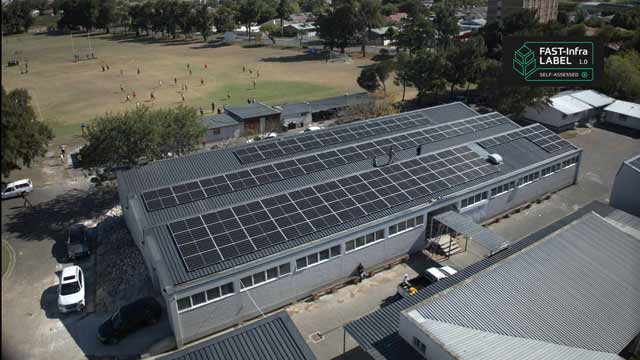
Solar PV Project for Schools in South Africa

Solar PV Project for Schools in South Africa

5 ways AI is helping us build climate-resilient infrastructure

5 ways AI is helping us build climate-resilient infrastructure
.jpg)
Infrastructure in a Changing World: Financing Resilience in Infrastructure Strategies
.jpg)
Infrastructure in a Changing World: Financing Resilience in Infrastructure Strategies

Strengthening Legal Foundations for Sustainable Infrastructure Finance: In conversation with Hayden Morgan

Strengthening Legal Foundations for Sustainable Infrastructure Finance: In conversation with Hayden Morgan

Financing Sustainable Infrastructure: International Standards and Chinese Practices

Financing Sustainable Infrastructure: International Standards and Chinese Practices
.jpg)
Managing Climate Risks and Building Resilient Infrastructure: 3 Questions with Natalia Moudrak
.jpg)
Managing Climate Risks and Building Resilient Infrastructure: 3 Questions with Natalia Moudrak

Driving Institutional Investment in Sustainable and Resilient Infrastructure

Driving Institutional Investment in Sustainable and Resilient Infrastructure

Net Zero vs. Carbon Neutral: What’s the Difference?

Net Zero vs. Carbon Neutral: What’s the Difference?
.jpg)
Building Resilient and Sustainable Infrastructure: An Interview with Peter Hall
.jpg)
Building Resilient and Sustainable Infrastructure: An Interview with Peter Hall
.jpg)
Enhancing Data Transparency & Due Diligence in Sustainable Infrastructure
.jpg)
Enhancing Data Transparency & Due Diligence in Sustainable Infrastructure
.jpg)
Incorporating Global Sustainability Best Practices into Infrastructure Projects
.jpg)
Incorporating Global Sustainability Best Practices into Infrastructure Projects
.jpg)
Sustainable Infrastructure Investment: Building a Resilient Future
.jpg)
Sustainable Infrastructure Investment: Building a Resilient Future
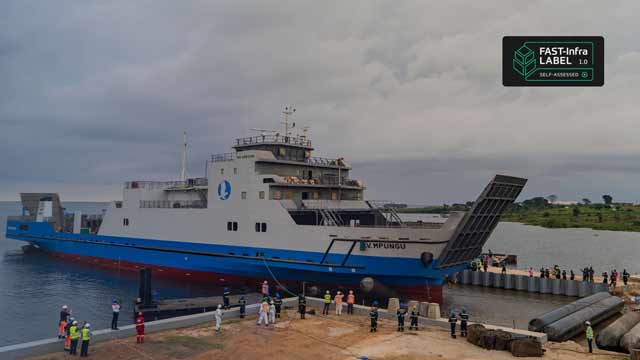
Enhancing East African Trade & Maritime Transport Across Lake Victoria

Enhancing East African Trade & Maritime Transport Across Lake Victoria
.jpg)
Sustainable Infrastructure, Scaled: Insights from the FAST-Infra Label Launch at WEF 2025
.jpg)
Sustainable Infrastructure, Scaled: Insights from the FAST-Infra Label Launch at WEF 2025

Accelerating Sustainable Infrastructure Development with the FAST-Infra Access Programme

Accelerating Sustainable Infrastructure Development with the FAST-Infra Access Programme

Sustainable Infrastructure, Scaled: The FAST-Infra Label Launch

Sustainable Infrastructure, Scaled: The FAST-Infra Label Launch

Global Sustainable Infrastructure Label Officially Launched at Davos, Backed by Leading Financial Institutions

Global Sustainable Infrastructure Label Officially Launched at Davos, Backed by Leading Financial Institutions

What is ESG and ESG Investing?

What is ESG and ESG Investing?
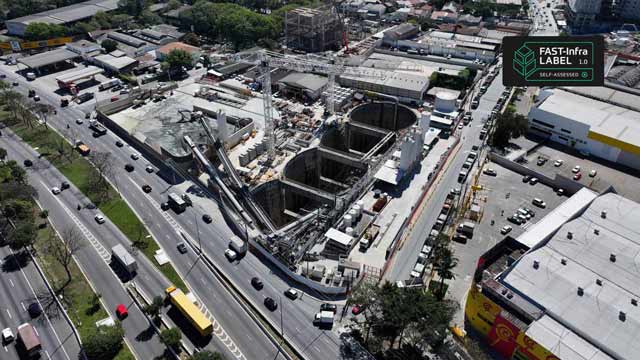
The L6 Metro Project: Addressing São Paulo’s Urban Mobility Challenge

The L6 Metro Project: Addressing São Paulo’s Urban Mobility Challenge

Scaling Sustainable Infrastructure: Insights from Market Leaders

Scaling Sustainable Infrastructure: Insights from Market Leaders

Mobilizing Private Investment in Sustainable Infrastructure with the FAST-Infra Label

Mobilizing Private Investment in Sustainable Infrastructure with the FAST-Infra Label

How can Contractors adopt Sustainable Infrastructure practices?

How can Contractors adopt Sustainable Infrastructure practices?

New York Climate Week 2024 : Addressing the $94 Trillion Infrastructure Investment Gap

New York Climate Week 2024 : Addressing the $94 Trillion Infrastructure Investment Gap
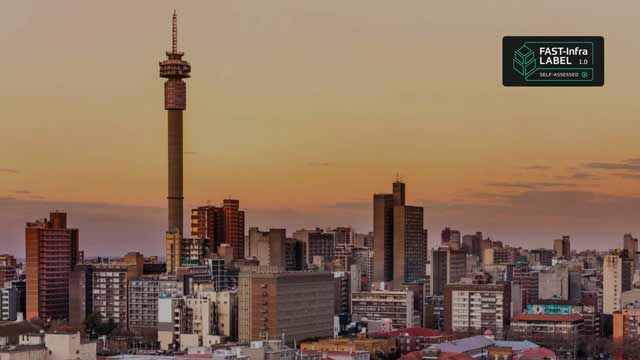
A Clean Utilities Model for Affordable Housing in South Africa

A Clean Utilities Model for Affordable Housing in South Africa

Insights from Webinar: Unveiling the Updated FAST-Infra Label Framework

Insights from Webinar: Unveiling the Updated FAST-Infra Label Framework

Addressing the infrastructure funding gap: Insights from Nathalie Gaullier

Addressing the infrastructure funding gap: Insights from Nathalie Gaullier

FAST-Infra Label Public Consultation results

FAST-Infra Label Public Consultation results

Unveiling the Updated FAST-Infra Label Framework

Unveiling the Updated FAST-Infra Label Framework

Insights from the OECD Panel on Certification and Labelling

Insights from the OECD Panel on Certification and Labelling

The FAST-Infra Label’s Mission to China

The FAST-Infra Label’s Mission to China

Join us to learn more about how you can give your input and feedback!

Join us to learn more about how you can give your input and feedback!

FAST-Infra Label at COP28

FAST-Infra Label at COP28
.webp)
Prioritizing Human and Labor Rights in Infrastructure Investments
.webp)
Prioritizing Human and Labor Rights in Infrastructure Investments
.webp)
Beyond Linear Models: The Way Forward with Circular Infrastructure
.webp)
Beyond Linear Models: The Way Forward with Circular Infrastructure

Steering Sustainable Infrastructure into the Future - The FAST-Infra Label Executive Advisory Committee meets

Steering Sustainable Infrastructure into the Future - The FAST-Infra Label Executive Advisory Committee meets

Fast-Infra Label at the WAPPP Abu Dhabi PPP Forum

Fast-Infra Label at the WAPPP Abu Dhabi PPP Forum
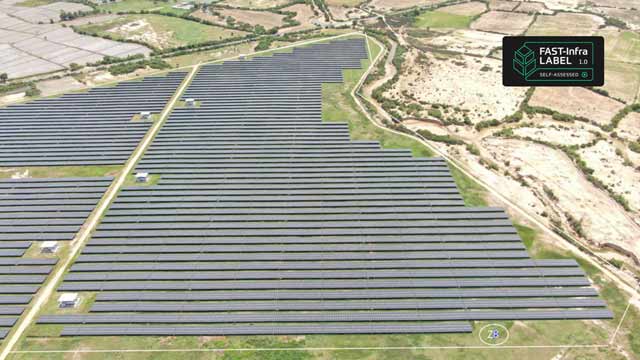
Climate Resilience with green energy in Vietnam: The path forward

Climate Resilience with green energy in Vietnam: The path forward
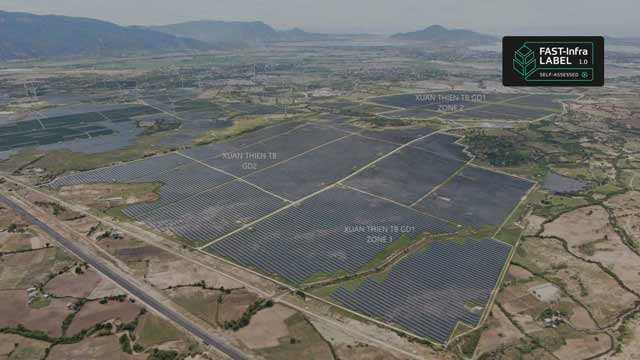
Decarbonizing Philippines with Solar Energy: A catalyst for change

Decarbonizing Philippines with Solar Energy: A catalyst for change
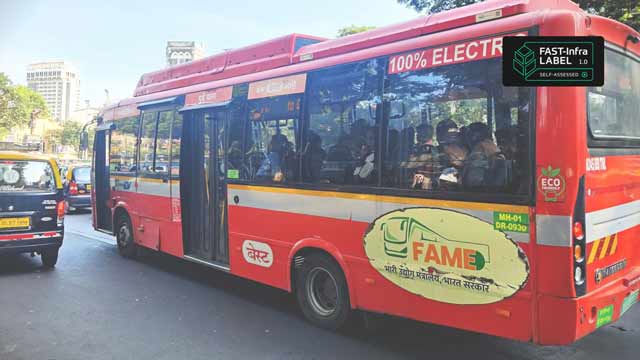
Powering Change: The Solar Solution to Mumbai's Electric Bus Revolution

Powering Change: The Solar Solution to Mumbai's Electric Bus Revolution

The case for investing in inclusive infrastructure

The case for investing in inclusive infrastructure

How can sustainable infrastructure contribute to Protection and Enhancement of Biodiversity & the Natural Environment?

How can sustainable infrastructure contribute to Protection and Enhancement of Biodiversity & the Natural Environment?

The importance of building resilience and adaptive capacity in sustainable infrastructure investments

The importance of building resilience and adaptive capacity in sustainable infrastructure investments

Introducing the FAST-Infra Label Framework: A Pathway to Sustainable Infrastructure Investment

Introducing the FAST-Infra Label Framework: A Pathway to Sustainable Infrastructure Investment

Milestone: Steering Committee Established for the FAST-Infra Label

Milestone: Steering Committee Established for the FAST-Infra Label

The FAST-Infra Label calls for Solar PV and Onshore Wind Projects to Rollout the Revised FAST-Infra Framework

The FAST-Infra Label calls for Solar PV and Onshore Wind Projects to Rollout the Revised FAST-Infra Framework

First Executive Advisory Committee Meeting of the FAST-Infra Sustainable Infrastructure® (FAST-Infra) Label

First Executive Advisory Committee Meeting of the FAST-Infra Sustainable Infrastructure® (FAST-Infra) Label

GIB Participates in the Summit for a New Global Financial Pact in Paris June 23, 2023

GIB Participates in the Summit for a New Global Financial Pact in Paris June 23, 2023

Unlocking Investment: The Crucial Role of Blended Finance in Bridging Infrastructure Financing

Unlocking Investment: The Crucial Role of Blended Finance in Bridging Infrastructure Financing

Building Sustainable and Resilient Cities: The Case for Investing in Multi-Sector Infrastructure

Building Sustainable and Resilient Cities: The Case for Investing in Multi-Sector Infrastructure

Going Green from the Get-Go: Six Reasons to Invest in Early Stage Sustainable Infrastructure Projects

Going Green from the Get-Go: Six Reasons to Invest in Early Stage Sustainable Infrastructure Projects

FAST-Infra announces FAST-Infra Sustainable Infrastructure® Label Secretariat and Data Repository

FAST-Infra announces FAST-Infra Sustainable Infrastructure® Label Secretariat and Data Repository


To stay in the loop, subscribe to our news and updates.




